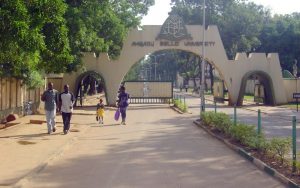The first surprise on sighting this book on the bookshelf of Dr Fr Innocent Jooji of the Department of Political Science at Veritas University was in the idea of Prof Okpeh Okpeh coming of age in scholarship in the discipline of History as for a book to be written in his honour. Certainly, many in the humanities would have come across his name somehow but not in relation to attaining the stature warranting a book in which the prompt is him.

Setting the table for the History-Nation’s conversation in Nigeria

A study in class and power in a Nigerian emirate
The surprise, however, melts very quickly when one comes across the names of some of those who wrote the ‘comments from reviewers’. They are today’s big names in that discipline, a discipline so ‘dangerous’ that Stalin is reported to have said it could not be left to its professionals alone. Stalin was suggesting what discourse theorists have now written into Historiography by dismissing basic facts as such and replacing facticity with interpretation. The implication is that there is no such thing as the correct History. History is a contested space of contending narratives where the ‘correct’ version is the one that emerges hegemonic at any one time before its demise.
History is, therefore, dangerous because it then becomes an unfailing power resource in the hands of Historians. This is why every contender to global, national and local spaces of power must have its own Historians or someone else would write what becomes the History. It is thus a matter of joy to have a 964 page book on a Historian in which numerous colleagues of his have put pen to paper on different dimensions of the subject and the subject matter.
The first point then is how this book is one of Nigeria’s best means of measuring the state of the discipline. If the state of the discipline is vigorous enough to enact Nigeria globally and also perform the nation domestically, it will be clear by the currency of the authors in matters of historiography, concepts and framing of the issues being interrogated. So also if it is so weak like most other disciplines in the Humanities Complex, particularly International Relations.

The library where the famous ‘Ibadan School of History’ underwent incubation, becoming where History was History in Nigeria

Entrance into ABU, Zaria, the home of the then famous ‘Zaria School of History’
A review of the book to determine that is not what this piece is about but putting this book in the news, at least within the audience of Intervention for a possible expansion of the readership of the book and a bigger conversation. It is right and proper to do so at a time the nation is down on its knees on almost all spheres of its existence.
Of course, it is a congested space of contentions about why Nigeria s on its knees. The fire is on the incumbent president, Muhammadu Buhari for the understandable reason that the position of the president in the Nigerian Constitution is without a repeater station in terms of the power granted the office. The office was created to act as the leading unifier. Once it is perceived to be leaving that track, hell will break open as it has happened. But there are other voices, not heard as loudly as the one above.
History and Historians in Nigeria, more than even the media which writes History of the everyday, has been a powerful voice in this debate, at least up to the late 1980s. Then the arrival in Nigeria of the beautiful lady called TINA, the universities’ share of her creative destructiveness, apologies to David Harvey and the beginning of the evaporation of universities in Nigeria as far as critical investigation of the social world is concerned. Today, many disciplines are on death bed in Nigeria when compared to what is going on in much of the world. History might not be the worst hit by TINA but History has gone quiet.
As already mentioned, this book and others like it helps us to gauge how sick the discipline is or otherwise. It has the potential of helping to determine whether the current joy about re-introduction of History as a school subject makes sense or not. Ordinarily, it should be that it is not History or any other discipline in itself that should be the cause for joy but the approaches to its study. If History today is all about facts without contexts, then of what use is it?
Intervention is not done with this book yet even if only for the good reason that it has a hefty section devoted to ‘Inter-group Relations’, the area Prof Okpeh has isolated for concentration in his engagement with History. Leafing through the chapters in that section in the context of globalisation should be rewarding, with particular reference to conflict transformation at a time of claims of marginalisation everywhere.




























